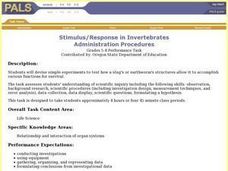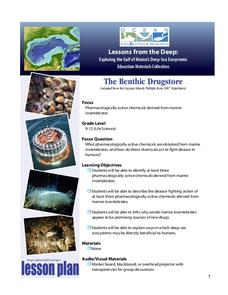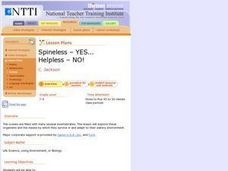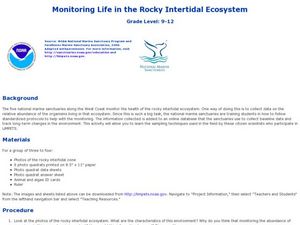NOAA
Invertebrates
Crabs and lobsters ... yum! The 18th installment of a 23-part NOAA Enrichment in Marine sciences and Oceanography (NEMO) program focuses on invertebrate marine life. After the lecture slideshow, learners conduct an activity to sample...
Curated OER
Invertebrate Research Project
Students keep a scientific research notebook on an invertebrate detailing its behavior and responses.
Curated OER
Invertebrates, No Backbone, No Problem
Third graders research an invertebrate, create a poster about it, then present it to the class.
Alabama Learning Exchange
Vertebrates or Invertebrates
Examine the differences between vertebrates and invertebrates as learners conduct Internet research, take an online invertebrate quiz, complete a vertebrate fact sheet, print out pictures of invertebrates they find interesting, and...
Curated OER
Design a Deep- Sea Vertebrate or Invertebrate
Young scholars design a deep-sea animal. For this research based lesson, students research and design a vertebrate or invertebrate that lives in a methane hydrate habitat. They compile a class chart of the adaptations animals have in...
NOAA
Watch the Screen!
Can a sponge cure cancer? Life science pupils visit the drugstore under the sea in the fifth lesson of six. Working groups research the topic then get hands-on experience by testing the inhibiting effects of several plant extracts on E....
Curated OER
Research Project
Learners learn the characteristics of arachnids by researching the arachnid of their choice and producing a 4 to 5 paragraph research paper.
NOAA
What Killed the Seeds?
Can a coral cure cancer? Take seventh and eighth grade science sleuths to the underwater drugstore for an investigation into emerging pharmaceutical research. The fifth installment in a series of six has classmates research the wealth of...
Curated OER
Internet Invertebrates Scavenger Hunt
In this invertebrates scavenger hunt activity, students research on the Internet 10 various types of invertebrates. They read each question first to determine what they need to look for on the Internet. Then, students respond to each...
Curated OER
Invertebrate Study
Students study invertebrates, more specifically flatworms, in this technology-based lesson which features www.nettrekker.com and word processing skills. The lesson concludes with each student create an individual word file of information.
Curated OER
Stimulus/Response in Invertebrates
Students design and conduct and experiment to determine how invertebrates react to an outside stimulus such as light and other stimuli. Student must develop a clear plan of action, collect data in an organized manner and analyze their...
Curated OER
Introductory Animal Research
In this introductory animal research worksheet, students cut out the 24 cards regarding types of animals, what they eat, where they live, the climate they live in, how they reproduce, and their impact on humans. The cards may be used to...
Curated OER
Ocean Life: A Heavy Subject
Second graders examine The Learning Page Fact Files about ocean life and categorize the data by weight and group. They distinguish between fish, mammals, and invertebrates and which weigh the most and the least. Students record their...
Curated OER
Animal Safari on the Internet
Learners verbalize, analyze and practice various research steps including using the Internet for searches and how to use bookmarked sites. They use these skills to research animals.
NOAA
Importance of Deep-Sea Ecosystems – The Benthic Drugstore
You never know what you will find next in the deep sea ecosystem. So far, scientists have found items that work as anti-tumor agents, anti-inflammatory agents, agents that stop uncontrolled cell division, and much more. The lesson begins...
Curated OER
Vertebrate/Invertebrate Venn Diagram
Students research the characteristics of Vertebrates and Invertebrates. They identify and explain those characteristics. Students create a Venn Diagram comparing/contrasting those characteristics.
Curated OER
Life Cycle: Diversity in a Balance
In this life cycle workbook, 3rd graders complete several different activities in which they analyze different invertebrates, identify arthropods, examine human biology and plants, and study natural environments. 20 different activities...
Curated OER
Mammals of Fields, Meadows, and Hedgerows
In this mammals instructional activity, learners research the internet to find information and answer short answer questions about mammals of fields, meadows, and hedgerows. Students complete 12 questions.
Curated OER
What Animal Am I?
Students brainstorm different characteristics of invertebrates and investigate invertebrates by conducting Internet research.
Curated OER
Spineless - YES... Helpless - NO!
Students distinguish between invertebrate and vertebrate organisms while examining the zoological classes of a number of invertebrates. They illustrate a food web of these organisms and investigate the impact of humans on the oceanic...
Curated OER
Mighty Macroinvertebrates
Seventh graders identify the names and features of macroinvertebrates found in Turtle River. In this ecology lesson students use digital microscopes and take pictures of invertebrates.
American Museum of Natural History
The Tree of Life
Groups of species can have more in common than meets the eye. An interactive cladogram shows some of the connections between important groups of species. Learners click on sections of the diagram to learn more about the connections or on...
Curated OER
Monitoring Life In The Rocky Intertidal Ecosystem
High schoolers investigate marine life by researching aquatic organisms on the Internet. In this oceanography lesson, students monitor algae and animals of the ocean by identifying their population and habitat on data sheet ID cards....
Curated OER
What Is in the Water?
Students compare bottled water qualities to water found naturally in a pond habitat. They research their state's laws/regulations in regard to bottled water and study the advertising, cost, and quality of brands of bottled water. They...

























